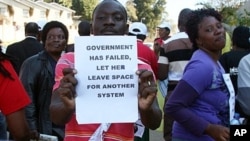In Swaziland, the leader of the banned opposition Peoples’ United Democratic Movement, PUDEMO, says the current economic crisis is a vindication of his group’s position that only democratic reforms can resolve the country’s problems.
Mario Masuku says it is unlikely the current political system, Africa’s last absolute monarchy, can resolve the country’s financial woes.
“We have said for a long time that all this crises that the country is experiencing -- economic, social, health, education and welfare -- are all just mere symptoms of an unworkable system of governance,” said Masuku. “It all centers on one question which is ‘what is the problem of Swaziland?’ And the problem of Swaziland, unfortunately, points to the issue of the monarchy.”
In its latest report, the International Monetary Fund (IMF) says the “fiscal crisis in Swaziland has reached a critical stage, with the government’s revenue collections insufficient to cover essential government expenditures, including the wage bill.”
The IMF also warns that the government will continue to face severe liquidity constraints in the coming months. It also projects real GDP growth to fall to 0.3 percent in 2011, notwithstanding an increase in agricultural and manufactured exports.
The Swazi government reportedly turned down a $2 billion South African bailout after the aid package was tied to democratic reforms.
Masuku insists democratic transformation is the only way to resolve the country’s financial challenges.
“PUDEMO has said over again that the monarchy [should] look after cultural and traditional issues and leave the government of the people to the people,” said Masuku. “The people should form their own government and elect their own cabinet. Then these [financial problems] will be able to be solved.”
He insists unless there is a multiparty democracy in Swaziland “we will continue to experience [troubles] irrespective of whether we get a bailout or not.”
But supporters of the administration reject PUDEMO’s assertion arguing that the global economic downturn has affected most countries, including Swaziland. They are calling for a “pragmatic dialogue” to help resolve the country’s financial challenges.
Masuku said the government has so far refused any efforts to engage opponents.
“We have been advocating dialogue since 1993. But, if the government is not amenable to negotiation and national dialogue, chances are this then [could lead to] a revolution,” said Masuku. “We are saying we are extending an olive branch [to them].”
He also said there are indications the government will soon be struggling to pay public sector workers, an assertion officials of the government deny.




